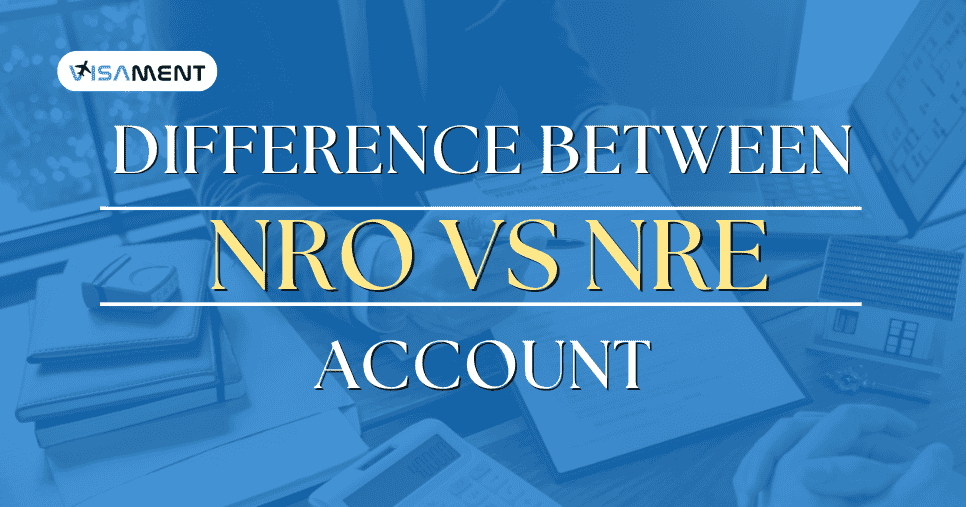As a working professional, living abroad, it is common to earn an income in a foreign currency. But what if you need an Indian bank account to put this income in? Or what if you have family in India that depends on you to manage investments and pay bills? For Non-Resident Indians (NRIs), sometimes it becomes quite difficult to manage their finances in India and overseas. Understanding the situation of NRIs, Indian banks offer them two types of bank accounts- NRE account (Non-resident external) and NRO account (Non-resident ordinary) to make this simple. This account type not only provides a safe place to keep your foreign income, but also helps you to use it for several payments in India while certifying that the balance is completely repatriable. Want to know more about the NRE account? Read this blog, it explains everything about it, from its benefits to the documents required to open this account. So, let's go start reading.
What is an NRE Account?
As stated above, a Non-Resident External (NRE) account is a bank account offered by Indian banks to NRIs to deposit their foreign earnings. This bank account is also suitable for overseas citizens of India (OCIs) and persons of Indian origin (PIOs) who wish to use their foreign income to manage investments and expenses in India. An NRE account is dominated by the Indian Rupee (₹) and maintained in Indian currency. In this account, the foreign currency is automatically converted into Indian rupees by the bank according to the prevailing currency conversion rates. Also, this account does not have any upper limit that you need to maintain.
This is all about an NRE account. Moving further, let's know in some detail who can Open an NRE Account in India.
Who Can Apply for an NRE Account?
Well, an NRE account is not for every foreigner who travels to India, no matter what purpose. Only PIOs, NRIs, and OCIs are eligible to apply for an NRE account. Additionally, under the prevailing FEMA guidelines, a person will be considered an NRI if:
- If he/she is living abroad except Bhutan or Nepal for more than six months in an accounting year (April-March).
- An individual had reflected an intent with supporting documents to go overseas or live outside of India for an unspecified time:
- Students planning for overseas studies
- Indian resident professionals, even before going overseas for jobs
- Seafarers who work on international ships
These are the people who can apply for an NRE account in India. Do you know that, apart from managing finances and helping with investments in India, an NRE account has several more advantages for the account holder? Want to know what they are? Read the next section and get your answers.
Benefits of Having an NRE Account
Here are the following perks of having an NRE account and which make it popular among NRIs:
- You can simply transfer your funds between India and other nations
- The account can be opened as a current or a savings account.
- NRIs can freely transfer both the principal amount and the earned interest in the NRE account to their resident country without any restrictions.
- Money generated through an NRE account, whether it is a transfer of funds from overseas or interest earned, is completely tax-free in India.
- NRE accounts provide easy accessibility through different payment channels such as mobile banking applications, ATMs, and online banking.
- You can open an NRE account jointly with an Indian resident or another NRI.
- Compared to a domestic Indian savings account, NRE accounts typically provide a higher rate of interest.
- NRE accounts have an automatic facility of currency conversion, allowing individuals to deposit and convert foreign currency to Indian INR with convenience and ease.
- Individuals having NRE accounts can also avail themselves of several loan facilities in India, such as personal loans, home loans, and education loans.
These are some of the advantages of having an NRE account. Having confusion about which funds you can transfer into your NRE account and which payments you can make through it? Read the next section and get your answers.
Funds Transfer and Payment through an NRE Account
Well, not only you, it is a general question of every NRI, the funds of which origin can be deposited in the NRE account and which payments can be made from it. According to the prevailing Foreign Exchange Management Act (FEMA) regulations, to provide you with an idea, here is a list of funds that can be debited or credited from an NRE account:
Funds that Can be Deposited in an NRE Account
These are the funds that you can deposit in your NRE account:
- Current income earned in India, such as pension, interest, rent, and dividends, among others.
- Remittance from your bank account abroad or transfer from a Foreign Currency Non-Resident Bank (FCNR (B)) or NRE account.
- Earned on investment or interest accruing on the account balance.
- Proceeds of investment maturity made from the NRE account.
Payments that Can be Made from an NRE Account
Here are the payments that you can make from an NRE account:
- Payment in India. For instance, managing family expenses and others.
- Investing in India, such as buying shares of listed companies, real estate, mutual funds, and fixed deposits.
- Transfer to your own NRO/FCNR (B)/ NRE accounts.
- Outward remittances from India
This was all about the fund deposit and payment you can make through your NRE account. Moving further, let's know about the documents required to open an NRE account.
Documents Required to Open an NRE Account
These are the following documents that you need to submit to open an NRE account:
- Passport
- PAN Card/Form 60
- Passport-size photograph
- Self-attested photocopy Official Valid Document (OVD): Driving license, voter ID, Aadhaar card, etc.
- Address proof: utility bill, electricity bill, Aadhaar card, etc.
- Proof of non-residential status, such as a visa, work permit, OCI card, or residence permit for Indian passport holders
- In case of a seafarer's account- photocopy of passport and visa, contract letter, or more.
- Foreign Account Tax Compliance Act (FATCA) declaration as applicable for the US, or Common Reporting Standard (CRS) for Canada, the UK, or any of the 100+ nations that are part of CRS.
These are the following documents that you generally require to open an NRE account. Moving further, let's know when you can open an NRE account.
When Can NRIs Open an NRE Account?
Once you become an OCI/ PIO/ NRI, under the prevailing FEMA regulations, you can apply for an NRI account as follows:
- After moving overseas: Once you move abroad, you can either visit your nearest overseas branch of your bank or download the NRE account application form from the site and submit the application to the local overseas branch or courier it to the designated bank offices/branches located in India. For further information on this, it is advisable to contact your relationship bank manager.
- Before moving overseas: Banks like HDFC, ICICI allow people such as students with admission to a foreign college, professionals transferred overseas, and seafarers to open an NRE account in India with the requested documentation. For this, you need to visit the nearest branch of your bank, fill up the NRE account application form, and submit it with the required documents.
This is how you can apply for an NRE account, whether overseas or in India. Subsequently, you can also visit the website of your bank and follow the guidelines to open an account online.
Final Thoughts
In this blog, we read everything about an NRE account and why it is so popular among foreign individuals of Indian origin. Being an NRI, OCI, or PIO, you can use this account to deposit your foreign-earned income. Having this by your side provides you with several advantages, such as repatriation of funds without any limitations and tax-free interest income in India. For detailed information about this, it is advisable to speak with your bank. With this, if you need assistance with your visa or any other immigration needs, feel free to connect with Visament. We have a team of professionals by our side who can assist you with all your immigration and visa needs.
Frequently Asked Questions
A Non-Resident External (NRE) account is a type of NRI bank account that allows Non-Resident Indians to deposit and manage their foreign earnings in India.
Non-resident Indians (NRIs), Overseas Citizens of India (OCIs), and Persons of Indian Origin (PIOs) are eligible for an NRE account.
Yes, an NRE account can use UPI.
Currency risk, Limited investment options, Withdrawal restrictions, Domestic transactions, and Account closure are some of the major disadvantages of an NRE account.
No, you cannot deposit rupees in an NRE account.
Yes, a Permanent Account Number is mandatory for an NRE account. If PAN is not available, Form 60 declaration is essential.
The penalty for an NRE account depends on the type of account and the bank
NRE Accounts are tax-free.
Well, it depends on your situation. If you are opening a bank account for depositing your financial income, then an NRE account is a better option for you. However, if you are opening the account for crediting your Indian income, then an NRO account is the right choice for you.
Yes, an NRE account is tax-free. It means that, for the account holder, the principal amount and the earned interest are free from tax. Additionally, the account holder is also free for the repatriation of the principal and interest amount without any limitations.
_1741066478.png)










